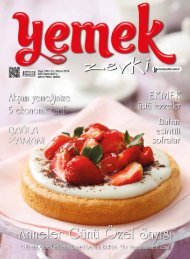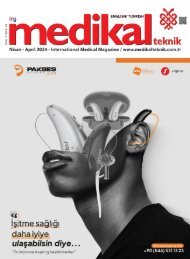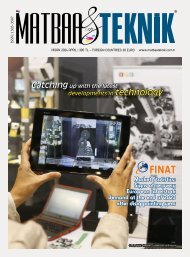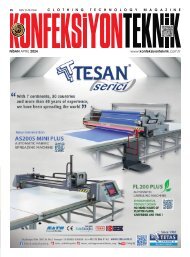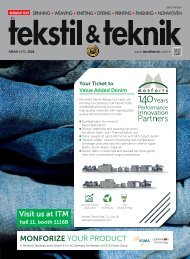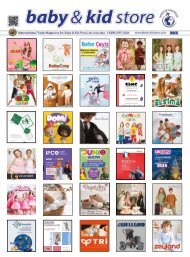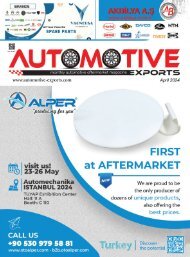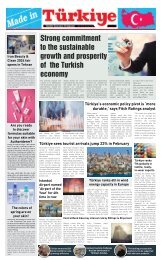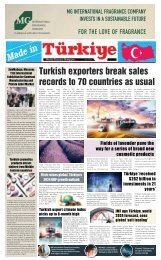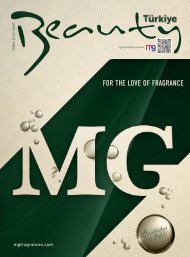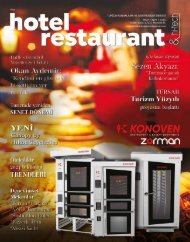Automotive Exports November 2019
- No tags were found...
Create successful ePaper yourself
Turn your PDF publications into a flip-book with our unique Google optimized e-Paper software.
www.automotive-exports.com
Monthly automotive aftermarket magazine
November 2018
Turkey-A global player in
automotive industry
American automotive
firm WABCO opens first
distribution center in Turkey
Top managers of
automotive industry
convened in Istanbul
Monthly automotive aftermarket magazine
GROUP CHAIRMAN
H. FERRUH ISIK
PUBLISHER:
İstmag Magazin Gazetecilik
İç ve Dış Ticaret Ltd. Şti.
Genel Müdür
Managing Editor
Mehmet Söztutan
mehmet.soztutan@img.com.tr
Mehmet Soztutan, Editor-in-Chief
mehmet.soztutan@img.com.tr
Competitive more than ever
The exports by Turkish automotive sector, which is the driving force of
Turkish economy, reached remarkable figures in the last decade. The
Turkish automotive industry has been active since the early seventies.
Since the full integration to the European Customs Union in 1994,
Turkey has become a major production platform for global automotive
manufacturers.
As known, the auto parts industry of Turkey has recorded a dynamic
growth in line with the automotive industry. From simple components in
the mid-1960s, the sector ascended to produce high-tech components
currently.
The industry with its large capacity, wide variety of production and high
standards, supports automotive industry production and the vehicles in
Turkey and also has ample potential for additional exports.
The leading foreign automotive parts manufacturers have established
a presence in the country through joint-ventures, which dominate
production and exports.
The export potential of the automotive parts sector, coupled with the
presence of major international automotive manufacturers, has attracted
an increasing number of foreign investors.
Key factors which attract foreign capital inflows to Turkey mainly include
the market size, consumer composition, friendly investment legislation
and liberal banking system together with other attractiveness arising
from highly skilled human resources in production and management,
the unsaturated domestic market with high potential, easy access to
neighboring (regional) emerging markets, and low labor cost.
The industry exhibit its full potential in major specialized fairs both at
home and abroad. Our publications remain at the service of those
businesses people seeking to increase their share in the increasingly
competitive foreign markets.
We are convinced that the events in which we participate have turned
out to be an ideal ground for the business people operating in the
automotive business.
We wish them lucrative trade.
Responsible Editor
Yusuf Okçu
yusuf.okcu@img.com.tr
Editor
Ayça Sarıoğlu
ayca.sarioglu@img.com.tr
Advertising Manager
Nihat Akman
otomotivnihat@gmail.com
Foreign Relations Manager
Yusuf Okcu
yusuf.okcu@img.com.tr
Consultant Editor
Leniiara Agliullina
Correspondent
İsmail Çakır
ismail.cakir@img.com.tr
Graphics & Printing Manager
Tayfun Aydın
tayfun.aydin@img.com.tr
Design & Graphics
sami.aktas@img.com.tr
Chief Accountant
Zekai Turasan
zturasan@img.com.tr
Finance Manager
Mustafa Aktas
mustafa.aktas@img.com.tr
Subsciption
İsmail Özçelik
ismail.ozcelik@img.com.tr
HEAD OFFICE:
Evren Mahallesi Bahar Caddesi Polat İş Merkezi
B Blok No:1 Kat: 4 Güneşli - Bağcılar/ İstanbul
Tel: (90.212) 604 51 00
Fax: (90.212) 604 51 35
www.img.com.tr turkey@ihlas.net.tr
KONYA:
Metin Demir
Hazım Uluşahin İş Merkezi C Blok
Kat: 6 No: 603-604-605 KONYA
Tel: (90.332)238 10 71 Fax: (90.332)238 01 74
PRINTED BY:
İHLAS GAZETECİLİK A.Ş.
Merkez Mahallesi 29 Ekim Caddesi İhlas Plaza
No:11 A/41 Yenibosna–Bahçelievler/ İSTANBUL
Tel: 0212 454 30 00
www.ihlasmatbaacilik.com
Please mention
Automotive Exports
when writing to advertisers
Monthly automotive aftermarket magazine
Turkey’s right-hand-drive
bus showcased in UK
Visigo HyPer - the first RHD bus model of Turkish company Anadolu
Isuzu - was put on display for the U.K. market at Euro Bus Expo 2018
in Birmingham.
Tugrul Arikan, general manager of the company, told that their RHD buses were only
manufactured for the U.K. market.
"We will produce more buses for the countries, including Northern Ireland, Malta, Turkish
Republic of Northern Cyprus (TRNC), Greek Cypriot administration, Singapore and Hong
Kong," Arikan said.
He said around 40 buses are expected to be sold in 2019.
Euro Bus Expo 2018 is the Europe's biggest bus and coach exhibition of the year, according
to its website.
Anadolu Isuzu is an open joint stock company, whose main field of activity is production
and sales of commercial vehicles such as light truck, truck, midibus, bus and pick-up.
Tugrul Arikan, general manager of
Anadolu Isuzu
Monthly automotive aftermarket magazine
Germany
fines Audi
nearly
$1 billion
over diesel
emissions
German authorities have fined
luxury automaker Audi 800
million euros ($925 million) for
selling cars with excessive diesel
emissions.
Prosecutors in Munich said that the fine
was imposed because Audi neglected
its oversight duties in selling cars with
engines made by it and group partner
Volkswagen that did not conform to
legal limits on harmful emissions. The
case covered some 4.9 million Audi cars
sold in Europe, the U.S. and elsewhere
between 2004 and 2018.
The Munich prosecutor's office said Audi
had accepted the fine.
Shortly after the announcement, the
company said the fine would affect its
2018 financial results.
"Taking into consideration the
extraordinary effects of the fine, the Audi
Group will significantly underperform...
on its forecast for 2018 financial results,"
the carmaker said in a statement.
In September 2015 parent company
Volkswagen admitted rigging some 11
million diesel autos with software that
enabled them to pass emissions tests
even though emissions in real driving
were much higher.
The prosecutors' statement said the
resolution of the case did not affect an
investigation of individual Audi executives.
14 November 2018
Monthly automotive aftermarket magazine
Minister Albayrak announces tax
reductions to revive economy,
reduce inflation
The economy administration has accelerated efforts
to boost economic activity and curb running inflation
with tax reductions and massive anti-inflation
campaigns with the support of the private sector.
prices has exceeded 25,000, the
minister said.
Berat Albayrak, Treasury and Finance Minister
Treasury and Finance Minister
Berat Albayrak announced a
comprehensive tax package to
cut value-added taxes (VAT) and
excise duties in a number of areas
including real estate properties,
furniture, commercial vehicles and
home appliances.
In his address at the Turkish Tax
Inspection Board (TTIB) in Ankara,
Minister Albayrak highlighted the
recent positive developments in
the Turkish economy.
"After the recent spike of the
Turkish lira, we are now observing
a reduction in the inflation. We will
see the mitigation of inflation in
October figures."
In September, inflation hit 24.52
percent on a year-on-year basis,
up 6.3 percent from the previous
month, according to the Turkish
Statistical Institute (TurkStat).
Inflation climbed for a sixth straight
month, hitting its highest level in
almost 15 years.
As noted in Turkey's New
Economy Program (NEP)
announced last month, the
country's inflation rate target
for this year is 20.8 percent.
The target for next year is 15.9
percent, 9.8 percent for 2020, and
6 percent for 2021.
Earlier this month, Minister
Albayrak announced a "full-scale"
program to reduce inflation with
the expansive support of the
public and private sector. The
number of corporations and
institutions that participated in
the program and cut down their
Among the measures announced
to curb inflation was a campaign
of minimum 10 percent
nationwide cut on prices. To
support businesses and maintain
investments, the banks will
decrease interest rates by 10
percent on loans issued after
Aug. 1. The treasury and finance
minister stressed that some of
the participating companies
have reduced prices by more
than 10 percent by up to 20 to
30 percent. In order to expedite
the fiscal reforms, the minister
said the structure of TTIB will be
redesigned.
The minister also announced a
number of reductions in six tax
items. The rate of VAT in real estate
had decreased from 18 percent to
8 percent over the last year as the
campaign continues until the end
of the year.
The title deed fees have been cut
to 3 percent from 4 percent. The
excise duty has been removed in
home appliance sales. The excise
duty in 1.6-liter motor vehicles has
been reduced by 15 percentage
points. Lastly, the 18 percent VAT
in commercial vehicles has been
cut down to 1 percent.
The minister said that these tax
reductions will revive economy
and will largely contribute to the
fight against inflation.
16 November 2018
Monthly automotive aftermarket magazine
The Central Bank revises up year-end
inflation forecasts
The Central Bank of the Republic of Turkey (CBRT) forecasted year-end
inflation rate in the country to reach 23.5 percent.
"We projected the inflation rate
to converge gradually to the
target under the assumption of a
tight monetary policy stance and
enhanced policy coordination
focused on bringing inflation
down," Central Bank Governor
Murat Çetinkaya said in a news
conference in Istanbul ahead of
the release of the bank's quarterly
inflation report.
The bank also foresees year-end
inflation for 2019 to reach 15.2
percent.
Çetinkaya said the inflation rate is
expected to stabilize at the bank's
medium-term target of 5 percent in
the medium term after it drops to
9.3 percent by the end of 2020.
He added that the inflation rate
would fluctuate between 21.9
percent and 25.1 percent through
to the end of 2018.
The rise in the forecast has been
driven by the upward revision in
the projections of lira-denominated
import prices, food inflation and
inflation in the third quarter of
2018, Çetinkaya noted.
According to the Turkish Statistical
Institute (TurkStat) on Oct. 3, the
country's annual inflation reached
24.52 percent in September.
Inflation climbed for a sixth straight
month, hitting the highest level in
almost 15 years. October's inflation
figures will be announced on Nov.
3.
Treasury and Finance Minister Berat
Albayrak said in mid-October the
Turkish economy will see inflation
drop in the last quarter of the year
as a result of the government's
expansive efforts to mitigate inflation
and economic rebalancing.
As noted in Turkey's New Economy
Program (NEP) announced on
Sept. 20 by Minister Albayrak, the
country's inflation rate target for
this year is 20.8 percent. The target
for next year is 15.9 percent, 9.8
percent for 2020 and 6 percent for
202.
18 November 2018
Monthly automotive aftermarket magazine
China’s Xi promises market
opening, more imports
President Xi Jinping promised to
open China wider to imports as
he opened a high-profile trade fair
meant to rebrand the country as
a global customer. But he offered
no response to U.S. and European
complaints about technology policy
and curbs on foreign business.
The China International Import
Expo is part of official efforts to
defuse trade tension while resisting
pressure to roll back industry plans
that Washington, Europe, Japan
and other governments say violate
its market-opening obligations.
"It is our sincere commitment to
open the Chinese market," Xi said
in a speech to a VIP audience that
included Russian Prime Minister
Dmitry Medvedev. Xi promised to
"stimulate the potential to increase
imports," including by cutting
costs for importers and improving
consumer spending power.
Xi's government is emphasizing
the promise of China's growing
consumer market to help defuse
complaints Beijing abuses the
global trading system by reneging
on promises to open its industries.
Business groups complain that
while Beijing is expanding imports
to serve its manufacturers and
consumers, it blocks access to
industries including finance and
logistics. They say regulators
are trying to squeeze foreign
competitors out of promising fields
such as information security.
Prime ministers and other senior
officials of governments including
Egypt, Pakistan and Vietnam also
are attending the fair.
The United States — China's biggest
trading partner — had no plans to
send a high-level envoy.
The expo is "likely not a huge benefit
or attraction for U.S. companies,"
said the chairman of the American
Chamber of Commerce in China,
William Zarit, in an email.
"Many may be attending because
they think it is politically smart," said
Zarit. "However, unless some of the
protectionist trade barriers currently
in place are changed, it won't
make much difference either way."
Xi made no mention of Beijing's
fight with President Donald Trump
over Chinese plans for stateled
development of technology
industries. But in an indirect
reference to Trump's "America
first" policies and threats of import
controls, he appealed to other
governments to "jointly safeguard
free trade."
China has cut tariffs and announced
other measures this year to boost
imports, which rose 15.9 percent
in 2017 to $1.8 trillion. But none
addresses U.S. complaints that
prompted Trump to impose penalty
tariffs of up to 25 percent on $250
billion of Chinese imports. Beijing
has responded with tariff hikes on
$110 billion of American goods.
Chinese leaders have rejected
pressure to roll back plans such
as "Made in China 2025," which
calls for state-led creation of global
champions in robotics and other
fields. Some American officials
worry that might erode U.S.
industrial leadership.
Trump and Xi had what China's
foreign ministry called an "extremely
positive" phone conversation. They
plan to meet this month during the
Group of 20 gathering of major
economist in Argentina, but private
sector analysts say a breakthrough
is unlikely.
The fight has added to challenges
for communist leaders are who
trying to shore up economic
growth that slumped to a postglobal
crisis low annual rate of
6.5 percent in the three months
ending in September. They also
are struggling to revive confidence
in a stock market that has tumbled
25 percent this year to become the
world's worst performer.
Xi acknowledged some Chinese
industries face "growing risks" but
said efforts to shore up growth are
already paying off.
"The fundamentals for sound and
steady growth of the Chinese
economy remain unchanged," he
said.
The expo fits in with Beijing's quest
to develop a trading network
centered on China and increase its
influence in a Western-dominated
global system.
China already is the No. 1 market
for its Asian neighbors and is
promoting its multibillion-dollar
"Belt and Road" initiative to expand
commerce by building ports,
railways and other infrastructure
across 65 countries from the South
Pacific through Asia to Europe and
Africa.
22 November 2018
Monthly automotive aftermarket magazine
Turkey top improver for first
time in Doing Business report
Turkey carried out a record number of business reforms in the past
year, earning the country a spot in this year’s top 10 global improvers,
read the World Bank Group’s Doing Business 2019: Training for
Reforms report on Oct. 31.
The reforms are a significant
acceleration of the country’s efforts
to improve the business climate
for domestic small and medium
enterprises, according to the
report.
As a result of the past year’s reforms,
Turkey advanced to 43rd place in
the global ease of doing business
ranking by climbing 17 ladders in
the list of 190 countries, the report
showed.
“I am pleased to note the priority
the government is placing on the
important agenda of improving
the business climate to boost
investment and produce jobs.
Given the current economic
environment in Turkey, it is,
nevertheless, encouraging to the
global business community and
local entrepreneurs alike to see the
process of conducting business
simplified in so many Doing
Business areas,” said Johannes Zutt,
the World Bank Country Director
for Turkey.
Some of the reforms implemented
in the past year were also
mentioned in the report.
According to the report, starting a
business was made easier and faster
by removing the paid-in minimum
capital requirement, eliminating
notarization requirements and
reducing registration costs. It now
takes seven days to start a business,
as opposed to being 10 days
previously.
Dealing with construction permits
was improved by publishing all preapplication
requirements needed
to obtain a construction permit
online, thereby enhancing the
process of construction permits.
Turkey now ranks 59 globally in this
area, compared with 96 last year,
it noted.
“Getting credit was also
strengthened by improving access
to credit information and enhancing
the rights of secured creditors in
bankruptcy proceedings. As a result
of this reform, Turkey catapulted to
32nd place globally in this area
from 77 last year,” it added.
Paying taxes was made easier by
improving the online portal for
filling and payments of taxes and
the time needed by a firm to file
taxes has been reduced to 170
hours from 215 hours.
The country performs best in the
areas of enforcing contracts, with a
global rank of 19, and a rank of 26
for protecting minority investors.
For example, resolving a
commercial dispute through a
local first-instance court in Turkey
costs 25 percent of the claim value,
compared to the regional average
of 26.3 percent.
It also performs well in the area of
registering property, with a global
rank of 39, and at just five days,
it is four times faster to register a
property transfer in Turkey than in
the region, according to the report.
However, the country
underperforms in the areas of
resolving insolvency with a global
rank of 109, paying taxes with
a rank of 80 and a rank of 78 for
starting a business.
24 November 2018
Monthly automotive aftermarket magazine
Five of top 10 auto brands
produced in Turkey
Five of the top 10 brands in the passenger car market are
manufactured in Turkey, with Renault, which has been manufacturing
in the country for 50 years, ranking first in the list. This trend shows
that consumers prefer cars produced by Turkish workers and engineers.
The market share of imported
automobiles has fallen by about 11.4
percent in the last five years, dropping
from 77.9 percent in 2013 to 70
percent in 2017 and to 66.5 percent
in January-October 2018. The share
of domestic automobiles produced
in Turkey, on the other hand, rose to
33.5 percent. Recent passenger car
investments in the automobile have
led to a decrease in the market share
of imported automobiles.
One of the leading automotive
companies in Turkey, Tofaş, started
to manufacture passenger cars in
its factory in Bursa with the Fiat
Egea sedan, while Oyak Renault
increased the number of its models
to two with the Renault Megane
sedan. Meanwhile, Toyota started to
produce the new SUV model C-HR
as well as the Corolla sedan in its
Sakarya factory. With the passenger
cars produced by Hyundai Assan
and Honda, the number of domestic
models sold in Turkey increased.
The imported-domestic balance in
the market has changed with the
recent figures. Consumers held the
most important role in this change as
they preferred the brands that were
produced in Turkey. The data of the
Automotive Industry Association also
proves this argument.
Accordingly, for the January-October
period, there are five brands that
are produced in Turkey among the
top 10 best-selling brands. Renault,
which has been producing in Turkey
for 50 years, ranks first in the list of
the best-selling brands with 61,820
units. Similarly, Fiat, which also has
investments in Turkey, comes third
with 29,727 units, followed by
Hyundai with 27,913, Honda with
22,435 and Toyota with 22,268
units.
The imported-domestic balance
is changing in the passenger car
trade but not enough. The number
of automobiles produced in Turkey
must increase in order to further
reduce the share of imported autos.
As in the world, demand for SUV
models in Turkey is increasing. In
the last four years, the SUV market
has grown at a high rate of 63.9
percent in Turkey. SUV sales, which
stood at 74,000 units in 2014, rose
to 122,000 units in 2017. In the
January-October period of 2018, the
market share of SUVs rose to 20.6
percent, amounting to 78,179 units
in sales. During this period, the bestselling
SUV model was the Nissan
Qashqai with 10,722 units, followed
by the Dacia Duster with 9,653 and
the Peugeot 3008 with 6,359 units.
In the January-October period, the
sedan auto market share was 50.7
percent. Most Turkish consumers
preferred sedan models. During this
period, eight of Turkey's top 10 bestselling
models were sedans, four of
which were produced in Turkey.
Among the models produced in
Turkey, 24,217 units of the Renault
Megane sedan were sold in the first
10 months, followed by the Fiat Egea
sedan with 23,740 units, the Honda
Civic Sedan with 17,656 and the
Toyota Corolla sedan with 16,351
units.
28 November 2018
Monthly automotive aftermarket magazine
Turkish government extends
free of charge space
allocations at industrial zones
The scope of free of charge spaces in Turkey’s organized industrial
zones has been extended, a decision by the Industry and Technology
Ministry has shown.
Mustafa Varank, Industry and
Technology Minister
According to the decision, which
was released on the Official
Gazette on Nov. 2, the spaces
at the organized industrial zones
in fourth-ranked districts will be
allocated without any fees.
This move was one of the measures
in a package announced by
Industry and Technology Minister
Mustafa Varank who previously
vowed to fight “the attacks against
the Turkisheconomy.”
According to the decision, the
existing “free of charge” space
allocation will continue to be
applied to the fifth-ranked and
sixth-ranked districts.
Rent discounts in the organized
industrial zones which are located
in the second-ranked and thirdranked
districts have also been
extended to 60 percent and
80 percent, respectively, from
a previous 40 percent and 60
percent.
The decision aims to further raise
production and employment
by fueling investments in the
organized industrial zones.
Turkey’s domestic electric car debuts
at exhibition in Istanbul
A domestically manufactured electric car has been
showcased at an exhibition in Istanbul for the first time.
The domestic car, the TM-480, which can be charged
in one hour at a fast charging station, consumes TL 10
($1.80) worth of electricity per 100 kilometers.
The electric car, which is completely domestic with
regard to external design, engine, interior design and
all other parts, could be on the market in a short time
if necessary procedures are completed. Domestic car
manufacturer Dr. Gürsel Güzel said that for the first time
they have showcased the domestic car they produced.
The report said all parts of the TM-480 have been
produced domestically. "The vehicle's interior design,
exterior design, mechanical design, chassis, bonnet and
engine are domestic. Motor drive, electronic equipment,
all control units and software belong to us," Güzel said.
The car has 150 kilowatts of engine power and 203
horsepower. A total of $6.5 million was spent on
research and development (R&D) in five years. While
mass production could start after six months, it can take
two-to-three years due to certification procedures, the
report added.
The range of the electric domestic car TM 480 is 400
kilometers. It consumes TL 10 worth of electricity per
100 kilometers. The announced price is TL 200,000
(approximately $36,000).
Established in 2014 under the leadership of Güzel, GEN
Otomobil completed its first electric vehicle prototype,
GEN1, and grew its team by employing talented
engineers experienced in the automotive industry.
After the team grew, GEN started research and
development (R&D) operations to develop three
different mass-producible models: a sedan, a hatchback
and an LCV, the statement on the company's official site
read.
GEN Otomobil made its first appearance with its
hatchback prototype in September 2017 at the
International R&D Summit and Fair organized by the
Architects & Engineers Group in Turkey. After completion
of the three different prototypes, GEN Otomobil will do
the necessary work for mass production, according to
the statement.
32 November 2018
Monthly automotive aftermarket magazine
October exports total highest
monthly value in Turkey’s
history, hit $15.7B
Ruhsar Pekcan, Turkish Republic Trade Minister
The increasing trend in Turkish
exports continued in October and
peaked in terms of monthly value; its
highest in the history of the Turkish
Republic. Trade Minister Ruhsar
Pekcan announced that Turkish
exports in October recorded a 13.1
percent increase compared to the
same period last year and reached
$15.7 billion. Exports over the
last 12 months hit $166.8 billion.
Pekcan stated that Germany, the
U.K. and Italy were the top three
destinations for Turkish exports in
October. The minister stressed that
exports will reach $170 billion by
the end of the year as foreseen in
the New Economy Program (NEP).
Pekcan noted that the country's
exports to target markets soar
swiftly. "Our exports to Mexico
advanced 14 percent, to India 16
percent and to Latin America 41
percent," she said and added that
exports to Africa also surged by 25
percent annually in October.
Imports dropped by 23.5 percent
in the same month and fell to
$16.2 billion. The ratio of exports
to imports was recorded at 65.4
percent in October 2017, Pekcan
recalled and drew attention to
the significant increase in this ratio
which hit 96.7 percent last month.
Russia topped the list of countries
from which Turkey imports with
$1.9 billion. It was followed by
Germany with $1.6 billion and
China with $1.4 billion.
The foreign trade gap plummeted
on a yearly basis in the month,
according to the data. The country
posted a foreign trade deficit of
$529 million for October, down 93
percent from the same month last
year. Moreover, the foreign trade
volume dropped to $32 billion in
October, falling 9 percent.
The automotive industry ranked first
among sectors with an export value
of $2.9 billion. Chemicals followed
the automotive industry with $1.59
billion, and the textile sector came
in third with $1.56 billion. The
highest sectoral rise was observed
in jewelry exports, which increased
by 113 percent in October.
The manufacturing sector
accounted for 81 percent of total
Turkish exports and recorded a 16
increase compared to the same
period of the previous year and
reached $12.7 billion. The exports
of agricultural products made up
13.8 percent of total sales abroad.
With a 4.1 percent rise, agricultural
exports in the same period totaled
$2.1 billion. The mining sector
composed 2.6 percent of the total
exports and reached $2.1 billion.
Turkish Exporters' Assembly (TİM)
Chairman İsmail Gülle highlighted
the historic high in the October
exports and stressed that exports
are key to accomplishing
macroeconomic goals, including
growth, cutting down the current
account deficit and reducing
unemployment. Gülle underscored
that TİM will continue working to
update the customs union. Turkey
and the EU have been in talks over
the modernization of the 1996
deal.
As the only non-EU member
country that has had a customs
union agreement with the EU
since 1996, Turkey has been one
of the largest trade partners of the
union with an export value of 69.8
billion euros and an import value of
84.5 billion euros in 2017 in goods
alone.
In its Dec. 21, 2016 assessment, the
European Commission proposed a
modernization of the current deal,
which only covers a limited range
of industrial products and excludes
agriculture, public procurement
and services. Highlighting that
the upgrade of Turkey-EU trade
relations forms an essential part of
efforts made by Turkey and the EU
to deepen relations in key areas of
common interest, the commission
reiterated its resolve to continue
delivering on the commitments it
has made as part of the deal with
Ankara.
34 November 2018
Monthly automotive aftermarket magazine
Turkey ranks first with highest rate of
exports in total automotive production
Turkey has overtaken Canada in the highest rate of exports in total
automotive production, ranking first by exporting 83.3 percent of its
total production.
According to figures from the
automotive industry research firm
Jato Dynamics, Canada led the
way with the highest rate of exports
in total production in 2017 with 82
percent, followed by Turkey with
80 percent, Mexico and Europe
with 79 percent and South Korea
with 59 percent. However, this
table changed in 2018. Having
increased its export rate to 83.3
percent, Turkey exported 83 of
every 100 vehicles manufactured.
The export journey of the Turkish
automotive industry began in the
first half of the 1990s. Exports,
which stood at thousands of units,
have risen to millions of units
today. With investments in the last
five years, Turkey has become one
of the few automobile exporting
countries in the world.
Based on data released by the
Automotive Manufacturers'
Association, six manufacturing
companies, the drivers of
exports, exported a total of 12.4
million passenger cars and light
commercial vehicles between
1994 and 2017. Including 2018
January-September exports, this
figure exceeds 13.3 million units.
Oyak-Renault has so far exported a
total of 3.7 million units, followed
by Ford Otosan with 3.2 million,
Tofaş with 3 million, Toyota with
1.9 million, Hyundai Assan with
1.5 million, and Honda Turkey with
126,000 units.
Celebrating its 50th anniversary
this year, Tofaş exported its three
millionth vehicle in October. About
half of Tofaş's exports of 3 million
units consisted of Doblo model
with 1.5 million units, followed by
Fiorito with 830,000 units. Tofaş
CEO Cengiz Eroldu recalled that 75
units of Murat 124, sent to Egypt
in 1974, went down in history as
the first export of Tofaş, adding in
1996, they later achieved the first
large-scale automobile exports of
the Turkish automotive industry
with their Tempra model.
Turkey maintains its title as the
country that exports the largest
number of motor vehicles to
Europe in 2018. According to data
from the European Automobile
Manufacturers' Association (ACEA),
Turkey led the way in vehicle
exports to Europe in 2017 with 1
million units. Followed by Japan
and South Korea, Turkey also ranks
first in passenger car exports.
36 November 2018
Monthly automotive aftermarket magazine
Yeni İsp Oto Yedek Parça penetrates
into foreign markets
ABD,AAPEX fuar,2017 Martex,Polonya 2014 Rusya, OOO MZ Tonar 2006
Founded in 2001, Yeni İsp Oto Yedek
Parça has been exporting quality
auto spare parts and accessories to
Russia, Ukraine, Poland, Lithuania,
Belarus, Kazakhstan, Uzbekistan,
Bulgaria and many other countries
for 20 years.
The Company also involves in
marketing of the automotive
products of a series of leading firms
operating in the industry such as
Meklas, Maysan Mando, Aydınsan,
Sem Lastik, Kale Balata, Besel Bijon,
Hobby Exhaust, Mesa, Kormas.
Erman Nuroğlu, one of the founders
of the Company, being an Associate
Professor of Polymer Physics, shares
his experiences with the clients.
Mürsel Serter, other partner of the
Company, has become a locomotive
of this sector with Sertplas which
is a well known company of the
automotive world.
Erman Nuroğlu, Chairman of the
Board of the Company attended
conferences organized for the
10th and 15th anniversary of
the establishment of MZ TONAR,
one of the biggest truck & trailer
manufacturer of the Russian
Federation, in 2005 and 2010. He
also participated in the international
conference on the New Solutions
for Automotive Electricity in Kaluga,
Russian Federation.
Yeni İsp Oto Yedek Parça Dış Ticaret
Ltd.Şti. represents the Turkish spare
parts sector successfully abroad.
Erman Nuroğlu regularly participates
in promotional activities at Frankfurt,
Moscow, Shanghai and Poznan fairs
and also undertakes the promotion
of automotive products abroad
as a participant at Automechanica
Frankfurt, Istanbul fairs and AAPEX
2017 Las Vegas, USA.
İstanbul,Automechanika,2018
Moskova MIMS,2018
FUAR 2011 Moskova
38 November 2018
Monthly automotive aftermarket magazine
American Varroc Lighting
acquires Turkish automotive firm
Exterior vehicle lighting specialist
U.S.-based Varroc Lighting Sytems
has acquired Istanbul-based
Sa-ba Automotive, a statement
confirmed.
"Through Sa-ba Automotive,
Varroc Lighting gains valuable
manufacturing and production
capacity with a 10,000-squaremeter
manufacturing and
technology center near
Istanbul, and a new plant under
construction in Dimitrovgrad,
Bulgaria," the statement said.
The terms and conditions of the
acquisition, however, were not
disclosed.
It also noted that the
20,000-square-meter Bulgaria
plant will give Varroc Lighting
expanded and scalable
production capacity for its
European customers.
"This acquisition further
underscores our commitment to
a global footprint that provides
our customers with cost-effective
and high-quality lighting products
and technology," said Stephane
Vedie, president and CEO of
Varroc Lighting Systems.
"Turkey is a growing market,
and our presence there helps
us expand the services we
can provide to our growing
customer base, while substantially
increasing our capabilities in small
lighting."
In the statement, Varroc Lighting
said that the acquisition was the
sixth business initiative in the past
16 months that directly support
the expansion of its global product
portfolio and manufacturing and
engineering footprint.
It also noted its manufacturing and
product development facilities
based in Morocco, Brazil, Japan,
and Poland. It recently opened an
expanded Lighting Development
Center in Ostrava, Czech Republic
while expanding manufacturing
capabilities in Vietnam.
With the acquisition of the
Istanbul-based company, Varroc
Lighting now has a global
presence in 17 countries across
five continents.
46 November 2018
Monthly automotive aftermarket magazine
Auto spare parts production up
Every year more than 500.000 vehicles are sold in Turkey, providing
a high demand for parts and component, and also for spare and
replacement parts. This paves the way for grounds for a powerful parts
industry and trade platform.
Domestic production of parts and
components ranges from diverse
products of engine and engine
parts to electrical equipment and
auto glass, just to name a few.
There are 1,120 parts and
components manufacturers in
Turkey. 70 % of those are small
and medium sized enterprises,
supporting many strong industrial
development zones all across the
country. The parts and components
industry is mainly concentrated in
the Marmara Region around Bursa
(a two hour drive from Istanbul).
Beside Bursa, Istanbul, İzmir,
Kocaeli, Ankara, Konya, Adana and
Manisa are home to many other
important manufacturing sites.
Due to high demand all over the
country, vehicle manufacturers
have already established their
authorized service station network.
In addition, there are thousands
of small and medium sized
garages located in every part of
the country, servicing the repair
and maintenance needs of the
large vehicle park in Turkey. Both
the network of service points and
the large pool of garages are
important to Turkey’s position as a
producer and consumer of parts
and components, as they are in
constant need of supply of various
parts from various price ranges.
Above that, there are more than
12,000 gas stations in Turkey.
Many of them offer repair and
maintenance services in addition
to their car wash facilities
and contribute to the positive
development of the automotive
parts industry.
Bursa prospers in automotive exports
Almost two-thirds of the roughly
900,000 vehicles that Turkey is
expected to export to foreign
markets are assembled in Bursa.
Thousands of people work in giant
car factories that produce vehicles
for global companies like Renault
and Fiat to be sold on the growing
Turkish market or to be shipped to
Europe.
The car industry in Bursa is hugewith
Renault and Fiat vehicles
manufactured in factories to be sold
in Turkey or exported to Europe.
More recently, government officials
and businessmen have been trying
to promote Bursa as a tourist
destination.
The Turkish automotive and spare
parts industry is concentrated in the
Marmara Region, mainly in Bursa.
Two major car factories and two
“Organized Industrial Zones” are
located in Bursa.
The automotive supplier industry
of Bursa produces almost all types
of parts, components and spare
parts such as engines and engine
parts, power train parts and
components, brake and clutch
parts and components, hydraulic
and pneumatic systems, suspension
systems, security systems, rubber
and plastic parts, chassis, frames
and parts, casting and forging,
electrical equipment and parts,
lighting systems, accumulator
batteries, seats etc.
The auto parts industry of Bursa has
developed rapidly as a consequence
of developments in the automotive
industry. The auto parts industry
with its large capacity, wide variety
of production and high standards,
supports automotive industry
production and the vehicles in
Bursa and also has ample potential
for exports. The automotive and
auto spare parts industry have
prospered dynamically in line with
ever increasing demand from
abroad.
48 November 2018
Monthly automotive aftermarket magazine
Stricter automobile emission
tests come into force across EU
Stricter emissions tests for all new
cars in the European Union went
into force.
It comes in response to the 2015
Volkswagen emission scandal, in
which some of its diesel cars were
rigged to fool tests while actually
emitting illegal levels of fumes in
real driving situations.
The new controls are part of the
Worldwide Harmonised Light
Vehicle Test Procedure (WLTP).
They are designed to measure
emissions using real driving data,
rather than a theoretical driving
profile, which was the basis for
previous tests, the EU said.
The EU's roll-out of WLTP began
one year ago, affecting all
car models that were being
introduced to the market for the
first time.
The rules apply to every new car
for sale.
"In the last three years since the
emissions scandal broke out,
we've cardinally changed the rules
of the game to prevent emissions
cheating, protect our public
health and the environment,
and boost our industry's
global competitiveness," EU
Industry Commissioner Elzbieta
Bienkowska said in a statement.
"Stronger emissions tests are a key
piece of the puzzle," she said.
The German car industry has
criticized the EU-mandated tests,
saying the change has taken place
too fast and warning they could
result in damaging production
shortfalls.
Earlier this year VW blamed
production bottlenecks on the
tests, while BMW temporarily
stopped production of some
models with gasoline engines in
order to make them compliant.
BMW said in July it had largely
completed the transition to WLTP.
Manufacturing index at 44.3
points in October
Turkey's Purchasing Managers'
Index (PMI) for the manufacturing
sector stood at 44.3 points in
October, according to a closelywatched
business survey.
An Istanbul Chamber of Industry
PMI Manufacturing Index report,
conducted in cooperation with
IHS Markit, showed a 1.6-point
month-on-month rise in October
pointing to a further easing of the
health of the sector.
While the PMI rose for the first
time since July, the survey showed
that the output, new orders and
employment moderated to lesser
extents in October.
"A more stable exchange rate
scenario led rates of inflation
for both input costs and output
prices to slow markedly over the
month," the report read.
The survey revealed that the latest
slowdown was less marked last
month compared to September,
while the output prices rose at the
weakest pace since March.
"A stabilization of the lira
exchange rate helped lead to a
marked slowdown in the rate of
input cost inflation in October," it
added.
The report also noted that new
export orders eased to a greater
extent for the second month
running.
A reading greater than 50
indicates the sector is growing,
while a reading below 50 signals
a contraction.
50 November 2018
Monthly automotive aftermarket magazine
Mercedes-Benz Türk’s R&D
center providing truck road
test, engineering services
The research and development
(R&D) center established by
the global automotive giant
Mercedes-Benz at its truck factory
in Turkey's central province of
Aksaray has become the "only
center" of the German automaker
Daimler AG that provides truck
road tests and engineering
services throughout the world.
The center is one of Mercedes-
Benz Türk's most important
developments in 2018. The
construction of the new R&D
center, whose foundation was laid
at the company's factory last year
with an investment of 8.4 million
euros, has been completed,
according to a statement by
Mercedes-Benz Türk.
With the said investment, Aksaray
province has been included in the
global network of R&D centers
in Germany, the United States,
Brazil, India, China and Japan by
Daimler AG, the parent company
of Mercedes-Benz Türk.
The auto manufacturer's Aksaray
Truck Factory has the title of
being the biggest employment
resource of the region with more
than 2,000 employees and its
sub-industry.
Mercedes-Benz Türk has
significantly contributed to the
Turkish economy since 1986 in
terms of investment in Central
Anatolia, production, exports and
employment.
In the center, the latest milestone
in the 51 years of the company's
adventure in the country, 251
Turkish engineers will continue
their work specific to the truck
product group.
The center will be the start and the
end point of the tests of all trucks
carrying the Mercedes-Benz star.
8,000 square meters of the total
area of 40,000 square meters of
the center is closed, with the rest
being the open area.
Thanks to the virtual reality and
mixed reality technologies used
in the new R&D center, which
was equipped consonantly with
requirements of the Industry
4.0, R&D engineers working all
over the world within the global
network of Daimler can work
together at the same time.
Mercedes-Benz Türk CEO Süer
Sülün recalled that in 2016, the
30th anniversary of the Aksaray
Truck Factory, they announced
the investment plan of 113 million
euros to boost the production
and employment capacities.
Sülün said the center will serve
with a capacity of 215 people in
all the research and development
processes from vehicle concept to
construction, including simulation
and vehicle tests.
"Our engineers will provide
truck road tests and engineering
services throughout the world.
We are proud that we will be
providing engineering services
to the world from Aksaray," Sülün
noted.
Mercedes-Benz Türk R&D Director
Mustafa Üstertuna said at the
new center, the truck and truck
parts will be tested by engineers
using the latest technological
equipment and software and
will be tested for reliability and
function in routes reflecting
customer usage and real road
conditions.
The parts and tools completed
at the Aksaray R&D center have
been approved to be valid in
all parts of the world, Üstertuna
continued.
"Our R&D engineers, who are
able to exchange information
with different teams within the
Daimler's global network in a
virtual environment, are having
an opportunity to develop future
technology within the global
ecosystem in Turkey at the same
time," he said.
"While important steps are being
taken for the development of our
truck and bus sector with our
R&D works, we are providing an
opportunity for the sub-industry
firms to be included in Daimler
AG's international portfolio, thus
paving the way for opening of
export ways from Turkey to the
world. In sum, while contributing
to Turkey's potential, we are
exporting engineering to the
whole world from Turkey,"
Üstertuna concluded.
52 November 2018
Monthly automotive aftermarket magazine
Turkey offers challenging
opportunities for global
manufacturers
According to Manufacturing Risk
Index 2018 research carried out by
the commercial real estate consulting
firm Cushman&Wakefield, China
has maintained the lead in global
manufacturing, while Turkey with
a cost advantage, infrastructure
investments and geographical
location, has entered the top 10 in
the world.
With the research, which examines
a range of risks and cost factors,
n the framework of research
including political and economic
risks as well as labor cost, a
comprehensive assessment of the
attractiveness of 42 countries for
global manufacturing was carried
out.
The report said the global economy
remains in good shape despite the
uncertainty surrounding the future
of U.S.' trade policies, the shape of
Brexit in Europe and heightened
geopolitical risk in the Middle East,
parts of Asia and Latin America.
"Global GDP [gross domestic
product] growth is forecast to
accelerate to 3.2 percent in 2018
from 2.9 percent last year. Multiple
factors support this outlook: The
robust economic fundamentals
of the U.S., Europe and China, a
cautious monetary policy by the
major global central banks and
strong trade growth. The global
exports of goods are expected to
grow by 5.5 percent in 2017 - their
fastest pace in five years - and by
over 4 percent in 2018," the report
read.
Industrial output in 2018 is
projected to increase by 3.8
percent globally - its fastest rate
since 2011 - and by 3.0 percent in
Europe, the report said.
It also suggested that economic
development and technological
trends will shape the type
and distribution of future
manufacturing, but the sector
will remain an engine of global
growth. By 2020, the report said,
manufacturing's share of the GDP
will exceed 20 percent in the top
60 largest global economies. In
China, manufacturing will still
account for a massive 30 percent
of the GDP in 2025. In the
Eurozone, manufacturing makes
up 17 percent of the GDP, led by
Germany with over 23 percent.
The report revealed that wage
hikes and growing labor shortages
in Central Europe are pushing
more cost-sensitive industries east
to Lithuania, Romania, Bulgaria
and Turkey.
"Emerging manufacturing locations
in Turkey, Romania and Bulgaria
are increasing in attractiveness
based primarily on cost," it added.
With infrastructure investments and
the strength of its geographical
location, Turkey continues to be
the leading production base in
the world. Its cost advantage,
infrastructure investments and
geographical location has
enabled the country to enter
among top 10 in the world. In
his assessment regarding the
report, Cushman&Wakefield
managing partner Tuğra Gönden
said economic, political and
technological developments
that have rapidly evolved have
affected countries' positions in the
production market.
Gönden also indicated that it is
possible with long-term structural
trends and strategic positioning to
ensure growth and sustainability in
an increasingly competitive global
manufacturing arena.
"Located at the intersection of
Europe, Asia, Russia and Africa,
Turkey's geographical location and
high-tech infrastructure investments
offer significant advantages in
terms of the global manufacturing
market. Despite the geopolitical
risks faced, our country continues
to be the production base of
Europe and the world. I believe
that by correctly evaluating the
location and potential of Turkey,
the country will be a shining star
in production in the long term,"
Gönden said.
56 OCTOBER 2018
Monthly automotive aftermarket magazine
Turkey maintains fiscal
discipline to keep inflation in
check, budget in balance
Turkish Treasury and Finance
Minister Berat Albayrak
Turkish Treasury and Finance
Minister Berat Albayrak reiterated
the government's commitment
to fighting against inflation and
accomplishing the budgetary
target by the end of this year and
next year. "We will analyze yearend
data for the budget and in
the new year, we will continue
to form policies with strong
commitment to the fiscal balancing
and budget discipline," Minister
Albayrak said in a live broadcast on
the A Haber news channel.
"We are fully committed to the
principle of budgetary discipline,"
he emphasized. The central
government budget balance
posted a deficit of TL 56.7 billion
($10.45 billion) in the period
of January to September and
budget revenues totaled TL 546.8
billion in this period, up nearly 20
percent year-on-year. Last year,
the budget deficit was TL 47.4
billion, totaling around 1.5 percent
of the country's GDP. The new
economic program suggests that
the government predicts that the
ratio of the budget deficit to GDP
will be 1.9 percent this year and
1.8 percent in 2019.
The positive indicators for
economic rebalancing are most
evident in the monthly surplus of
the current account. "The October
data is expected to outperform
and we will see a better outlook
in November and December," the
minister said.
One of the macroeconomic
issues the government is tackling
the inflationary pressures which
disrupted pricing behaviors in the
real economy.
"We observed distorted pricing
mechanisms in September, which
is reflected in inflation data,"
the minister said. "In October,
inflation started to slow down. In
November and December, more
positive data for inflation will be
seen as the Turkish lira has spiked
against the U.S. dollar and lira,
dragging down production costs."
The downward trend in oil prices
and energy costs will also facilitate
a reduction in the inflation, the
minister stated. Minister Albayrak
also highlighted that last week's tax
reductions will reduce the inflation
in the last two months of the year.
Last week, Albayrak announced
a comprehensive tax package
to cut value-added taxes (VAT)
and excise duties in a number
of areas including real estate
properties, furniture, automotive
products and home appliances.
Turkey's Consumer price index
(CPI) increased by 25.24 percent
year-on-year in October, according
to data released by the Turkish
Statistical Institute (TurkStat).
The Turkish lira weakened after
the report and was trading 0.2
percent lower at 5.45 per dollar
in the afternoon. The currency
lost nearly half of its value against
the dollar amid a diplomatic row
with the U.S. but has rebounded
by more than 25 percent from
August's all-time low.
In September, inflation hit 24.52
percent on a year-on-year basis,
up 6.3 percent from the previous
month, according to TurkStat.
Inflation climbed for a sixth straight
month, hitting the highest level
in almost 15 years. Last week,
the Turkish Central Bank revised
Turkey's year-end inflation rate
forecast to 23.5 percent.
As noted in Turkey's New
Economy Program announced last
month, the country's inflation rate
target for this year is 20.8 percent.
The target for next year is 15.9
percent, 9.8 percent for 2020,
and 6.0 percent for 2021. Over
the past five years, the annual
inflation saw its lowest level at 6.13
percent in April 2013, while the
figure reached its highest level this
October.
In order to curb the inflation and
ensure a balance in the pricing
behaviors, the Treasury and
Finance Ministry launched a fullscale
campaign in early October
with the support of private sector.
Among the measures announced
to curb inflation was a campaign
of minimum 10 percent
nationwide cut on prices. To
support businesses and maintain
investments, the banks will
decrease interest rates by 10
percent on loans issued after
Aug. 1. The treasury and finance
minister explained that some of
the participating companies have
reduced prices by more than 10
percent by up to 20 to 30 percent.
Minister Albayrak stressed that
more than 2,500 companies have
participated in the campaign with
expansive discounts.
58 November 2018
Monthly automotive aftermarket magazine
American automotive
firm WABCO opens first
distribution center in Turkey
Belgium-based U.S. company
WABCO Holdings, one of the
leading global suppliers of
braking control systems and
other advanced technologies
that improve the safety, efficiency
and connectivity of commercial
vehicles, officially opened its first
distribution center in Turkey.
Sources said that the center
has been established with an
investment of TL 100 million
($16.67 million).
"Underlining WABCO's continued
commitment to Turkey and its
significant investment in the
region, the 2,000-square-meter,
state-of-the-art facility based in
Istanbul enhances the distribution
capab
ilities for WABCO's extensive
portfolio of technologies and
services to support the needs
of local aftermarket customers,
original equipment manufacturers
and trailer builders in the country,"
the company said in a statement.
Speaking at the opening
ceremony, Investment Office
President Arda Ermut said that
WABCO's investment proves the
company's trust in the Turkish
economy. "We have already
started to discuss with WABCO its
new investments in Turkey. It will
be very important to boost our
competitiveness and added value
in the automotive sector," Ermut
said.
The company added that it has
maintained a 36-year relationship
with Intermobil, its exclusive
representative, fourth-party
logistics provider and supply chain
management partner in Turkey,
and will further build its local
customer relationships through
improved product availability,
quicker response times and local
customer service excellence.
"Present in Turkey since 1982,
WABCO has forged deep
relationships across the Turkish
commercial vehicle industry,
which includes some of
the world's leading original
equipment manufacturers," it
added.
WABCO's investment in Turkey
has grown significantly in recent
years, the statement read. "In
2011, WABCO opened an
International Sourcing and
Purchasing Office in Istanbul
which currently purchases over
$50 million of commodities
annually, ranging from metals to
rubber and casting to forging, as
well as assembly parts sourced
from over 20 Turkish suppliers."
The new distribution center
was inaugurated at a grand
opening event, hosted by
WABCO Chairman and CEO
Jacques Esculier. Customers,
industry representatives, central
government officials, suppliers,
partners and WABCO employees
were present on the occasion.
"Demonstrating our commitment
to Turkey and building on
our major $50 million annual
expenditures here, we strongly
believe that our investment in this
cutting-edge distribution center
will help further contribute to
the growth of the commercial
vehicle industry in the region,"
said WABCO Chief Supply Chain
Officer Nicolas Bardot, at the
opening ceremony. "In addition to
enabling WABCO to significantly
increase access to our extensive
portfolio of advanced products
and services to our aftermarket
customers and trailer builders
in Turkey, these investments
will help foster even closer
relationships with local suppliers
to deliver further value and
differentiation for our customers,"
added WABCO president EMEA
Nick Rens.
60 November 2018
Monthly automotive aftermarket magazine
Turkey’s foreign trade deficit
falls 77.1 pct in September
Turkey's foreign trade deficit saw
an annual fall of 77.1 percent in
September, the country's statistical
authority announced.
Last month, Turkey's exports went
up 22.4 percent year-on-year
to $14.45 billion, while imports
decreased by 18.3 percent to
$16.3 billion. In September, the
country's foreign trade deficit
amounted to $1.87 billion, down
from $8.17 billion.
"In September 2018, exports
coverage imports was 88.5
percent while it was 59.1 percent
in September 2017," TurkStat said.
Official data showed that
Germany with $1.42 billion was
the top market for Turkish exports.
"The country was followed by the
U.K. with $1.05 billion, Italy with
$816 million and Iraq with $719
million," it added.
The institute said the top country
for Turkey's imports was Russia
with $1.7 billion in September,
followed by China ($1.5 billion),
Germany ($1.4 billion) and the
United States with $1.1 billion.
In the nine-month period, exports
totaled $123.04 billion with an
annual hike of 7 percent, and
imports were $174.16 billion, up
3.1 percent over the same period.
As a result, Turkey's foreign trade
balance in January-September
posted a deficit of $51.1 billion
- down 5.2 percent - as the
deficit was $53.9 billion over the
same period last year. Exports
to Turkey's major trade partner,
the EU, totaled $61.9 billion or
accounted for 50.4 percent of
all exports, while the country's
imports from the bloc were $63.4
billion.
The Near East and Middle Eastern
region was the second largest
export market for Turkish products
with some $21.5 billion, followed
by African countries with nearly
$10.3 billion.
The EU was followed by the
countries in Asia with an amount
of $55.2 billion on the imports
side.
In 2014, Turkey's exports hit an
all-time high of $157.6 billion,
while the figure was nearly $157
billion last year.
Over the past five years, the
highest export-to-import ratio on
a yearly basis was recorded in
2016 with 71.8 percent, while
Turkey's foreign trade deficit has
fallen from $99.8 billion in 2013
to $76.8 billion in 2017.
62 November 2018
Monthly automotive aftermarket magazine
Turkey’s automotive exports
record second-highest monthly
figure, hit $2.9B in October
One of the driving forces of the
Turkish economy, automotive
industry exports hit $2.9 billion in
October, marking a year-on-year
rise of 11 percent. This figure was
the second-highest export figure
after the record of $3.1 billion
in March on a monthly basis,
according to Uludağ Automotive
Industry Exporters' Association (OİB)
data. Meanwhile, the share of the
automotive industry in total exports
stood at 19 percent. As far as
product groups go, exports by the
automotive subindustry grew by
3 percent to $939 million, private
car exports by 10 percent to $1.19
billion, motor vehicles for goods
transport by 5 percent to $471
million and bus-minibus-midibus by
26 percent to $178 million.
On the country basis, exports
to Germany, the largest market,
decreased by 2 percent, while
exports to the U.S. rose by 24
percent, to Poland by 15 percent, to
Morocco by 40 percent, to Algeria
by 122 percent and to Slovenia
by 48 percent. Also, exports to
Romania, Spain and Iran, which are
among the major markets, dropped
by 12 percent, 10 percent and 75
percent, respectively.
Exports to the European Union, the
largest market on the basis of the
groups of countries, went up by 13
percent, reaching $2.27 billion in
October. European Union countries
had a 78 percent share in exports.
While exports to African countries,
which are among alternative
markets, soared by 60 percent,
exports to Middle Eastern countries
plummeted by 41 percent.
The automotive industry exported
$433 million worth of goods to
Germany, up by 4 percent, which
is the largest market on a national
basis, followed by Italy, the secondlargest
market, with $278 million
with a 3 percent rise. On the other
hand, exports to France tumbled by
7 percent to $269 million.
OİB Chairman Baran Çelik stated
that exports in the automotive
industry reached $26.3 billion with
a 12.5 percent upsurge in the first
10 months of the year.
Expressing that the average export
volume of the automotive industry
was $2.6 billion in the January-
October period, Çelik said, "In
October, exports of private cars
and bus-midibus-minibus increased
by double digits, while exports
of towing vehicles continued to
increase at high rates. Exports
to European Union countries
and African countries increased
by 13 percent and 60 percent,
respectively."
66 November 2018
Monthly automotive aftermarket magazine
Taysad: Competent
representative of the Turkish
automotive supplier industry
Established in 1978, TAYSAD is the sole and most
competent representative of the Turkish automotive
supplier industry.
TAYSAD plans its activities in line with its vision
and mission and aims at becoming a center of
attraction in the automotive industry, by enhancing
its capability as a representative association, its
effectiveness in the sector, as well as the cooperation
between members and by providing better-quality
services to meet members’ changing needs.
The major facts are:
• Established in 1978, TAYSAD is the sole and most
competent representative of the Turkish automotive
supplier industry
• With 408 members, TAYSAD represents 65% of the
output of the automotive supplier industry and 70%
of the industry’s exports
• 80% of TAYSAD’s members operate in the Marmara
region;12% in the Aegean region and 8% in other
regions of Turkey
• 408 TAYSAD members employ more than 160,000
people.
• 25% of TAYSAD members have foreign partners
who hold varying levels of shares
• TAYSAD is a member of CLEPA, the European
Association of Automotive Suppliers (www.clepa.be)
• TAYSAD is the founding partner of OTAM -
Automotive Technologies Research & Development
Company.
• TAYSAD has a reference position within Turkey for
domestic and international OEM’s, Tier 1 Suppliers
and institutions being the representative of Turkish
Automotive Parts and Components Suppliers
• TAYSAD holds ESCA Silver Label and ISO 9001
Certificates.
The product range of TAYSAD members covers all
sorts of parts except a few items and is sufficiently
diversified to support an 85-90% local parts ratio in
domestically-produced motor vehicles. The main
product groups manufactured by TAYSAD members
operating in the motor vehicle manufacturing
industry can be classified as follows:
• Complete engines and engine parts,
• Radiators
• Heating, ventilating & air conditioning systems
(HVAC systems)
• Power trains,
• Brake systems and parts,
• Hydraulic and pneumatic spare parts,
• Suspension parts,
• Safety spare parts,
• Foam and rubber parts,
• Chassis parts and spare parts,
• Forged and cast parts,
• Electrical equipment and illumination systems,
• Batteries,
• Automobile glass,
• Seats
• Design & Engineering services
• Simulation services
• Special vehicle production
In order to adapt to the changing competitive
environment, TAYSAD members closely follow
technological developments and continue to invest
in innovation and expansion. With the help of their
advanced manufacturing capabilities, they produce
prototypes, use testing facilities, perform CNC-based
and conventional machining, engage in product
development, pursue collective R&D activities with
foreign and domestic companies and use CAD-CAM
applications during the design process.
Vision
To become, by 2023, a sectoral association
representative of all companies in Turkey, that supply
goods and services directly and indirectly to the
automotive industry; a sectoral association which
pursues and supports activities increasing the local
share in global automotive manufacturing to at least
3%; and a sectoral association which has gained
complete public support.
Mission
To provide the environment and conditions for
developing the Turkish automotive industry as
a whole and making Turkey one of the leading
supply centers of the global automotive industry, by
supporting its members as a collective organization.
68 November 2018
Monthly automotive aftermarket magazine
Turkey-A global player in
automotive industry
During the 1990’s, as other international manufacturers like Toyota,
Honda, Hyundai, Isuzu and Mercedes-Benz entered the market, Turkey
rapidly became an automotive production base which not only caters
to one-time developments of the industry but rather holds long-term
development options.
Today, Turkey has a
thriving automotive sector,
demonstrating substantial
growth in the past. All players
involved, including local
authorities and the government,
are participating in providing
conditions to increase output in
the future. Some of the facts are:
-High level of integration into the
global automotive industry
-14th major automotive producer
in the World, with 78% average
export rate
-Vehicles of Turkish origin hold
the leading position among the
vehicles coming from outside of
EU
-Production, export, and
engineering hub of global
brands for international markets
-Quality products with high
export rates
-Hundreds of Tier 1 companies
working directly with OEMs
-Center of excellence in
automotive engineering and
R&D, in which new technologies
are developed
Strong international presence
-Giants of global automotive
value chain benefit from Turkey’s
location, cost, and competitive
advantages
-Because of their profitable
business in the country,
companies in Turkey continue to
invest in the country’s future
-9 R&D centers support not only
the local operations, but also
the operations in other plants of
parent companies.
-Ford Otosan’s R&D department
is one of Ford’s 3 largest global
R&D centers
-R&D center in Bursa is the only
center of Fiat outside of Italy
serving the European market.
-For Courier, Ford’s new light
commercial vehicle, the Yeniköy
plant is the sole production
center in the world.
-Toyota’s C-HR Hybrid is
produced in Turkey for World
markets
-Daimler R&D is the center of
competence for some parts and
carries global responsibility.
-With more than 40 thousand
employees, automotive OEMs are
one of the major employers in
the manufacturing industry.
70 November 2018
Monthly automotive aftermarket magazine
Top managers of automotive
industry convened in Istanbul
Held for the fifth time WAC 2018,
World Automotive Conference,
attracted record number of
visitors. Over 40 directors and
top-level managers were at the
conference that was visited by
902 people. Ersin Kara, director
of the conference emphasized on
the timing of the event that has
become a strategic organization
that helps to establish networks
for cooperation in these critical
days.
Organized by Worldwide
Partnership, a London
headquartered firm,
representatives of leading firms
in automotive industry discussed
the future of the industry.
Panel, case studies, group
workshops and team activities
were the main events in the
conference and participants
find opportunities to share their
experiences.
Ersin Kara expressed his
satisfaction about the results
of the event and said, “We are
happy to share our experiences,
knowledge and to establish
serious business connections.”
Some of the names in the event
has expressed their views,
among them was Demet Yavuz,
consumer finance director of
Garanti Bank. She said, “Behind
the success of the industry
lays the cooperative efforts of
financial firms. 25 years ago, we
have to visit first the showrooms
of sellers for several times, then
we start to look for credit for the
car we wanted to buy. Now,
we have contracts with car
dealers for funding directly their
customers. People now have
become able to order and buy
a vehicle as if they are ordering
a pizza. They can get their car
delivered at their door steps.”
CIO of Mercedes-Benz Turk,
Gokce Bezmer said thet their
company emphasize on sharing
vehicles and they are developing
new ways and schemes to sold
cars to the members of new
generation. He said, “80 % of
earnings in the automotive
industry that has a sales volume
of 3.5 billion dollars in the world
accounts car sales. The sales
is expected to reach up to 6.7
billion dollars in 2030 and only
55 % of it will come from sales,
the 25% will be earned from
mobile services.”
Hakan Kostepen, Panasonic
America director, has told about
data based communities they
formed and the importance of
movement of people, goods,
data and energy. He said,
“Mobility changes lives of the
people. Community 5.0 is a new
term invented in Japan, that
focuses on peoplenet in addition
to worldwide internet.”
Ozlem Derici Sengul, an
economist, has told about
investment on technology,
human resources, and on R&D.
She said, “50 trillion of dollars
currency that was injected in he
world economy has been started
to call back since 2015. We do
not have luxury of working with
short term funds. For this reason
we have to plan for the next ten
to twenty years.
Carlos Moreira, CEO of Wisekey
firms from Switzerland has
emphasized on the data security
issues in automotive industry
and said that there is an urgent
need to design new cars having
asymmetric identity systems to
prevent hacking attempts.
72 November 2018
Monthly automotive aftermarket magazine
Oyak-Renault lays foundation for its
$115M plant in Turkey’s Bursa
Turkish-French auto manufacturer
Oyak-Renault laid the foundation
of its high-pressure aluminum
injection molding plant in Bursa.
The $115-million plant will produce
aluminum engine blocks for the
company's new generation of
hybrid vehicles, Turkey's Industry
and Technology Minister Mustafa
Varank said in the groundbreaking
ceremony.
"The plant investment was made
under the project-based incentive
system," he added. Varnak said
that the products made at the plant
would be exported. "It [the plant]
will contribute to employment and
exports while reducing Turkey's
current deficit of by $2.3 billion
annually."
Necessary parts in the engine
block production will be provided
by domestic manufacturers and
suppliers, the minister said.
Renault Senior Vice President
Nicolas Maure said that the plant
was the first step in the company's
future investment plans in Turkey.
Maure added that the company
has renewed its partnership with
Oyak for another 27 years.
Oyak-Renault, founded in 1969,
produces some 360,000 cars and
750,000 engines annually.
74 November 2018
4. – 7. 4. 2019
Türkiye’nin Lider Uluslararası
Otomotiv Endüstrisi Fuarı
TÜYAP Fuar ve Kongre Merkezi
İstanbul / Türkiye
www.automechanika.com.tr
TÜRKİYE CUMHURİYETİ
TİCARET BAKANLIĞI
Türkiye Cumhuriyeti
TİCARET BAKANLIĞI
İŞ ORTAKLARI
DESTEKLEYENLER
/automechanikatr /automechanikaistanbul
/automechanikatr
Automechanika Istanbul
Automechanika Istanbul
BU FUAR 5174 SAYILI KANUN GEREĞİNCE TOBB (TÜRKİYE ODALAR VE BORSALAR BİRLİĞİ) DENETİMİNDE DÜZENLENMEKTEDİR.
12.Uluslararası
Günes Enerjisi ve Teknolojileri Fuarı
.
Günes . Enerjisi‘nin Devleri Solarex Istanbul‘da Bulusuyor .
04-06 Nisan 2019
İstanbul Fuar Merkezi / Yeşilköy
9-10-11-12. Hall
Ziyaret Saatleri
10:00-19:00
Ücretsiz Davetiye için/Free Invitation
www.solarexistanbul.com
0212 604 50 50 BU FUAR 5174 SAYILI KANUN GEREĞİNCE TOBB (TÜRKİYE ODALAR VE
www.solarexistanbul.com
info@solarexistanbul.com
BORSALAR BİRLİĞİ) DENETİMİNDE DÜZENLENMEKTEDİR.



